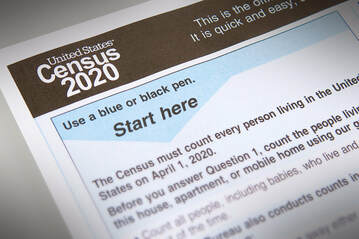APA Justice began covering the 2020 Census in 2017. The decennial census determines the number of seats each state has in the U.S. House of Representatives and is also used to distribute hundreds of billions of dollars in federal funds to local communities. An accurate and fair census ensures political representation of Asian Americans. The 2020 Census was among the most turbulent in recent times. APA Justice retires this webpage in March 2022.
Learn about Gerrymandering to the Supreme Court
|
|
Background

Article 1, Section 2 of the U.S. Constitution mandates a count of the population to apportion seats in the House of Representatives. The next Census Day will be April 1, 2020. It will be the 24th decennial census of the nation and one of the most challenging.
On March 29, 2018, the Census Bureau announced the last-minuite inclusion of a citizenship question and the additonal use of administrative records in the 2020 Census. The decision was made by Commerce Secretary Wilbur Ross with an 8-page decision memorandum.
This decision will have short-term adverse impacts on the completeness and accuracy of the 2020 Census results, such as disproportinately depressing the responses of immigrant communities, as well as long-term effects on the privacy rights for all Americans.
Commerce Secretary Ross has claimed that the request to add the citizenship question was made by the Department of Justice (DOJ) to "more effectively enforce Section 2 of the Voting Rights Act." The need was to obtain complete-count data at the census block level from the 2020 Census instead of the block-group level data that DOJ has been receiving annually from the American Community Survey.
The House Oversight and Government Reform Committee has issued subpoena for testimony on the citizenship question and 2020 Census, but the Department of Justice has refused to comply with the congressional subpoena.
At least eight lawsuits have been filed by state and local governments, civil rights organizations, and concerned citizens to oppose the additon of the citizenship question. Six cases have been decided in the three District Courts against the citizenship question. There is one lawsuit in support of the citizenship question.
The Supreme Court held a hearing on April 23, 2019, and ruled on June 27, 2019.
On March 29, 2018, the Census Bureau announced the last-minuite inclusion of a citizenship question and the additonal use of administrative records in the 2020 Census. The decision was made by Commerce Secretary Wilbur Ross with an 8-page decision memorandum.
This decision will have short-term adverse impacts on the completeness and accuracy of the 2020 Census results, such as disproportinately depressing the responses of immigrant communities, as well as long-term effects on the privacy rights for all Americans.
Commerce Secretary Ross has claimed that the request to add the citizenship question was made by the Department of Justice (DOJ) to "more effectively enforce Section 2 of the Voting Rights Act." The need was to obtain complete-count data at the census block level from the 2020 Census instead of the block-group level data that DOJ has been receiving annually from the American Community Survey.
The House Oversight and Government Reform Committee has issued subpoena for testimony on the citizenship question and 2020 Census, but the Department of Justice has refused to comply with the congressional subpoena.
At least eight lawsuits have been filed by state and local governments, civil rights organizations, and concerned citizens to oppose the additon of the citizenship question. Six cases have been decided in the three District Courts against the citizenship question. There is one lawsuit in support of the citizenship question.
The Supreme Court held a hearing on April 23, 2019, and ruled on June 27, 2019.
Short-term and Future Implications
2018/08/06 Jeremy Wu: The 2020 Census: From the Citizenship Question to Data Privacy
2018/04/09 Jeremy Wu: The Citizenship Question in the 2020 Census: Protecting Civil Rights or Pretext to Shift Political Power?
2018/04/09 Jeremy Wu: The Citizenship Question in the 2020 Census: Protecting Civil Rights or Pretext to Shift Political Power?
Visit Lawsuits for more details about lawsuits related to the 2020 Census filed by state and local governments, civil rights and professional organizations, and concerned individuals.
Visit Continuing Developments for more details on huindreds of media and government reports on the 2020 Census, beginning with the planned census questions in March 2017 as required by law.